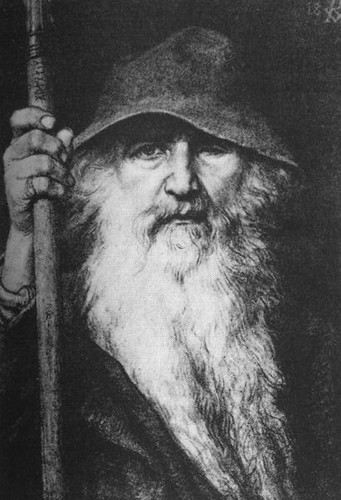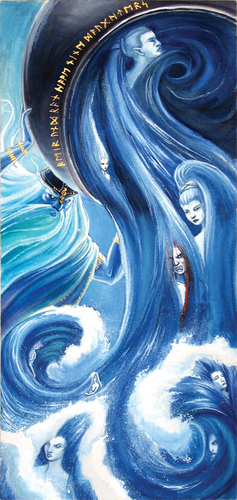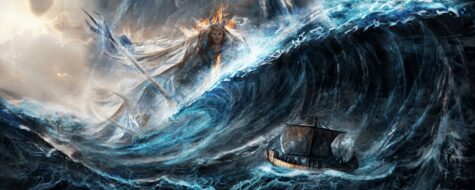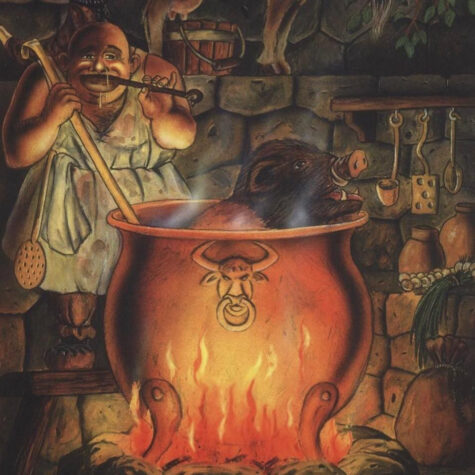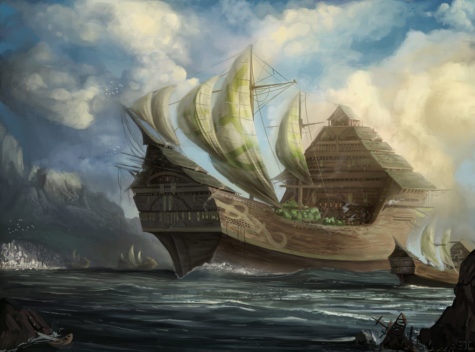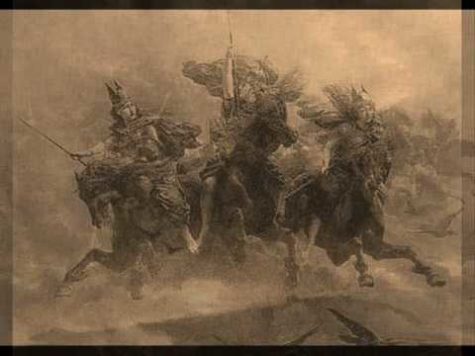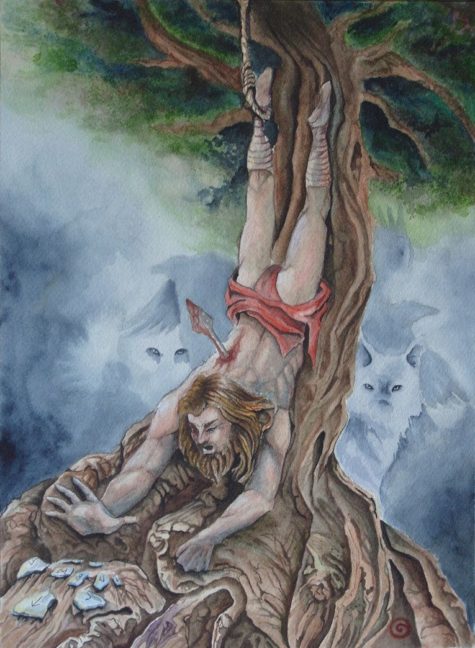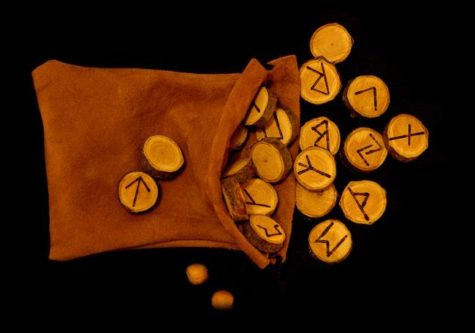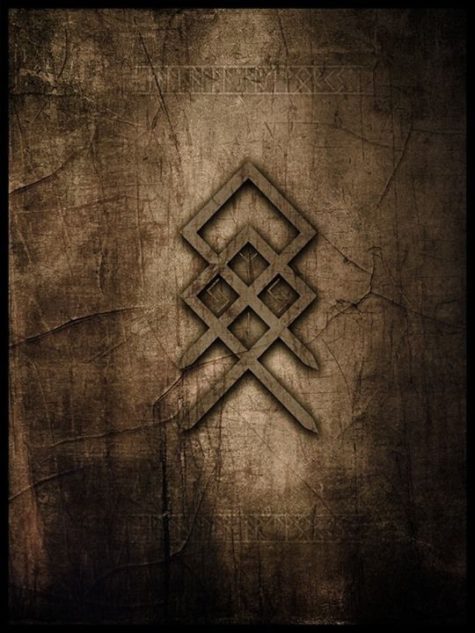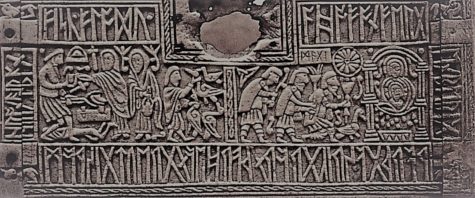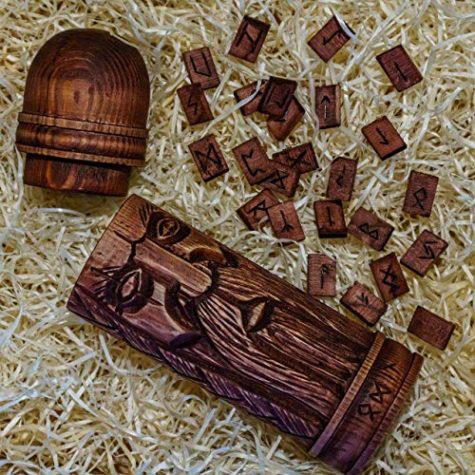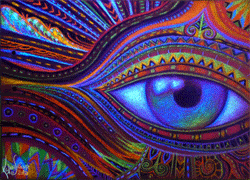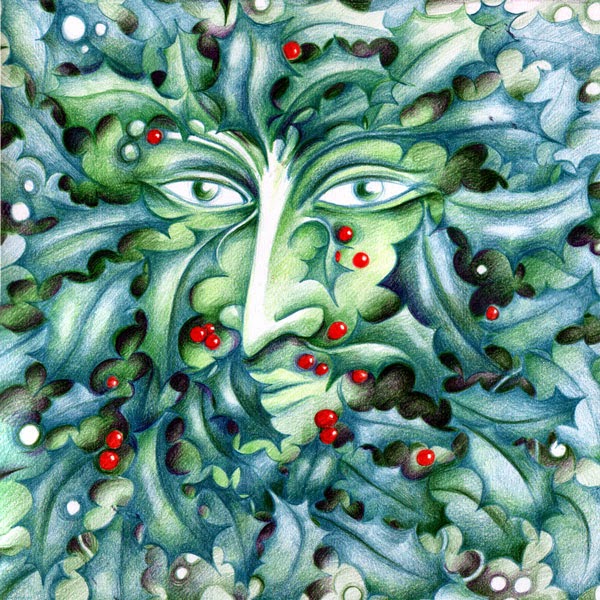Norse
An Alternative Odin Story
Odin: The Norse Biggy. Odin is Father of the Gods, King of Asgard, Ruler of the Aesir and the Lord of War, Death and Knowledge. To travel the world without being recognized, he wears a huge wide-brimmed hat. He also — thanks to Loki — rides an eight-legged horse named Sleipnir into battle. All he needs is a six-shooter and a sheriff’s badge to be able to stand in for John Wayne in True Grit.
His biggest fans include the Berserkers, which should give you some idea. He’s also very hot on Knowledge and Military Intelligence, having two ravens, Huginn and Muninn, who fly around the world every day bringing up-to-date reports.
Odin himself has only one eye, having traded the other one for a sip from Mimir’s Well of Wisdom during his visit to the great World Tree Yggdrasil. Consequently he’s full of knowledge, while his missing eye is hidden in an unknown location care of Mimir the Talking Head. The eye enabled Mimir to focus on far-distant events, allowing Odin the ability to always see far ahead.
To become the Top Wise Guy, Odin put himself through some incredibly rigorous ordeals. The Well of Wisdom lies under the second root of Yggdrasil, which allows the Dew of Knowledge to seep into it. So Odin stabbed himself with his own spear and hung himself on the tree for nine days and nights. He was then allowed a peep, and saw magic runes appear on rocks beneath him. With a superhuman effort he struggled to lift them, which must have been quite an acrobatic feat. Running his eye over the mystic symbols, he was instantly freed of all encumbrances; restored and rejuvenated with everlasting vigor enabling him to drop lightly to the ground.
His ordeal accomplished, Odin was at last able to take a well-deserved swig from Mimir’s well, making him well-wise as well as wise. It was even tastier than his usual tipple Kvas, the Mead of Inspiration, a special brew made from the blood of Kvasir. If you think a wise one-eyed Norse cowboy on an eight-legged horse would be easy to recognize, this ain’t necessarily so for Odin is a shape-changer, and his range of disguises make Sherlock Holmes look like Miss Marple. He also travels incognito under a variety of false names.
Sharing primeval God status with brothers Ve and Vili, the Great Odin helped bring the world as we know it into being, so we can forgive his little foibles. The legend tells that in the ice-laden wastes of Niflheim, he got into a rather catastrophic snowball fight with Ymir, the king of the Frost-Giants. The Abominable Snow Giant was slashed into pieces and Odin made the world from all the bits. He even found a use for the eyebrows. Odin’s dad is Bor, son of Buri, son of an ice cube. Married to Frig (with the occasional Freya fling and flirtation with Rind).
Who is Odin?
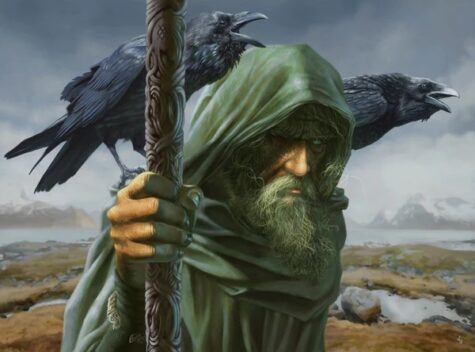
ODIN (Woden to the Anglo-Saxons) is a god of the mysterious realms of wisdom, cunning, sorcery, and death. Subtle, aristocratic, and at times inexplicable, Odin is the literal father of important gods, such as Thor, and All-Father to the whole of creation, divine and human. Amongst his gifts was the greatest of all: the gift of writing. To accomplish this Odin hung himself upside down upon the World Tree, the gigantic ash Yggdrasil ( a compound meaning “terrible horse”). After nine days of fasting and agony, in which “he made of himself a sacrifice to himself”, he “fell screaming” from the tree, having had revealed to him in a flash of insight the secret of the runes. Their initial manifestation took the form of eighteen powerful charms for protection, increase, success in battle and love-making, healing, and mastery over natural causes.
This story illustrates an important dynamic of the Northern pantheon, which did not allow for omnipotence: even Odin must pay his due. At Mimir’s well, which lay deep under the roots of Yggdrasil, the World Tree, the god had earlier chosen to undergo an important forfeit. Odin paid with one eye for a single drink of the enchanted water. His mouthful granted him wisdom and fore-sight. It is due to this sacrifice that Odin’s face is depicted with a straight line indicating an empty eye, or alternately, in a wide-brimmed hat pulled down low over the missing orb.
His quest for knowledge was never-ending. Upon his shoulders perched two ravens, Hugin (“Thought”), and Munin (“Memory”). These circled the Earth each day, seeing all, and then at night reported to Odin what they had learnt. He cherished them both, but particularly Munin, which seems to underscore the importance he placed on rune writing, record keeping, and honouring the heroic deeds of the past.
There is another bird associated with Odin, the eagle. The god often transformed himself into this canny raptor, both to view the workings of the world and to intervene when an avian form was better suited to his ends.
Odin’s fabulous grey horse Sleipnir (“Slippery One”) was like no other. This eight-legged horse was the offspring of a giant’s magical stallion and the “trickster” god, Loki, who disguised himself as an alluring mare to distract the stallion from the task of building a wall around Asgard, home of the Gods. If the wall had been completed by a certain date, Freyja, the goddess of beauty, war and sexuality would have been forfeit to the giant as payment for his labours. (The gods also stood to lose the Sun and the Moon, but did not seem particularly concerned about their impending loss!)
Loki was successful, but vanished for a few seasons as he had to bear the fruit of his trickery. He returned to Odin leading his equine offspring, which he presented as a gift. With his eight legs, Sleipnir could run twice as fast as ordinary steeds, and it is he who carries the valiant dead from the battle field to Valhalla.
In this realm warriors fought all day yet never died from their wounds, were made whole again in time for supper, at which they feasted upon the flesh of a similarly eternal magical boar who was born anew each day. Intoxicating mead filled their drinking horns, and the many-room hall rang with the song of the victorious rewarded there. Not a bad end for a pragmatic folk who lived and died by their iron.
For an alternative look at Odin, check out this post.
Aegir’s Feast
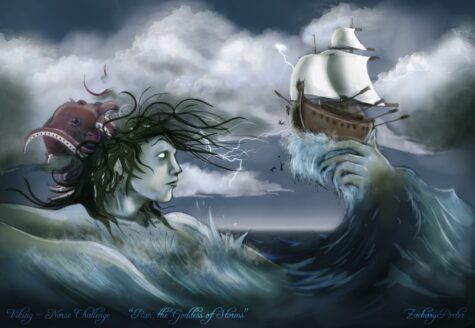
Ægir was the ruler of the ocean, and his home was deep down below the tossing waves, where the water is calm and still. There was his beautiful palace, in the wonderful coral caves; its walls all hung with bright-colored seaweeds, and the floor of white, sparkling coral sand. Such wonderful sea-plants grew all about, and still more wonderful creatures, some, which you could not tell from flowers, waving their pretty fringes in the water; some sitting fastened to the rocks and catching their food without moving, like the sponges; others darting about and chasing each other.
“Deep in the wave is a coral grove,
Where the purple mullet and goldfish rove;
Where the sea-flower spreads its leaves of blue,
That never are wet with falling dew,
But in bright and changeful beauty shine
Far down in the green and glassy brine.
The floor is of sand, like the mountain drift,
And the pearl-shells spangle the flinty snow;
From coral rocks the sea-plants lift
Their boughs where the tides and billows flow.
The water is calm and still below,
For the winds and waves are absent there,
And the sands are bright as the stars that glow
In the motionless fields of upper air.”
—Percival.
In that ocean home lived the lovely mermaids, who sometimes came up above the waves to sit on the rocks and comb their long golden hair in the sunshine. They had heads and bodies like beautiful maidens, with fish-tails instead of feet.
One day the gods in Asgard gave a feast, and Ægir was invited. He could not often leave home to visit Asgard, for he was always very busy with the ocean winds and tides and storms; but calling his daughters, the waves, he bade them keep the ocean quiet while he was away, and look after the ships at sea.
Then Ægir went over Bifröst, the rainbow bridge, to Asgard, where they had such a gay party and such feasting that he was sorry when the time came to go home; but at last he said good-by to Father Odin and the rest of the Æsir.
He thanked them all for the pleasure they had given him, saying, “If only I had a kettle that held enough mead for us all to drink, I would invite you to visit me.”
Thor, who was always glad to hear about eating and drinking, said, “I know of a kettle a mile wide and a mile deep; I will fetch it for you!”
Then Ægir was pleased, and set a day for them all to come to his great feast.
So Thor took with him his brother, the brave Tyr, who knew best how to find the kettle; and together they started off in Thor’s thunder chariot, drawn by goats, on their way to Utgard, the home of the giants.
When they reached that land of ice and snow, they soon found the house of Hymir, the giant who owned “Mile-deep,” as the big kettle was called. The gods were glad to find that the giant was not at home, and his wife, who was more gentle than most of her people, asked them to come in and rest, advising them to be ready to run when they should hear the giant coming, and to hide behind a row of kettles which hung from a beam at the back end of the hall.
“For,” said she, “my husband may be very angry when he finds strangers here, and often the glance of his eye is so fierce that it kills!”
At first the mighty Thor and brave Tyr were not willing to hide like cowards; but at last they agreed to the plan, upon the good wife promising to call them out as soon as she had told her husband about them.
It was not long before they heard the heavy steps of Hymir, as he came striding into his icy home; and very lucky it was for Thor and Tyr that the giantess had told them to hide, for when the giant heard that two of the Æsir from Asgard were in his home, so fierce a flash shot from his eyes that it broke the beam from which the kettles hung, and they all fell broken on the floor except Mile-deep.
After a while the giant grew quiet, and at last even began to be polite to his guests. He had been unlucky at his fishing that day, so he had to kill three of his oxen for supper. Thor being hungry, as usual, made Hymir quite angry by eating two whole oxen, so that, when they rose from the table the giant said, “If you keep on eating as much at every meal, as you have to-night, Thor, you will have to find your own food.”
“Very well,” said Thor; “I will go fishing with you in the morning!”
Next morning Thor set forth with the giant, and as they walked over the fields toward the sea, Thor cut off the head of one of the finest oxen, for bait. Of course you may know that Hymir was not pleased at this, but Thor said he should need the very best kind of bait, for he was hoping to catch the Midgard serpent, that dangerous monster who lived at the bottom of the ocean, coiled around the world, with his tail in his mouth.
When they came to the shore where the boat was ready, each one took an oar, and they rowed out to deep water. Hymir was tired first, and called to Thor to stop. “We are far enough out!” he cried “This is my usual fishing-place, where I find the best whales. If we go farther the sea will be rougher, and we may run into the Midgard serpent.”
As this was just what Thor wanted, he rowed all the harder, and did not stop until they were far out on the ocean; then he baited his hook with the ox’s head, and threw it overboard. Soon there came a fierce jerk on the line; it grew heavier and heavier, but Thor pulled with all his might. He tugged so hard that he broke through the bottom of the boat, and had to stand on the slippery rocks beneath.
All this time the giant was looking on, wondering what was the matter, but when he saw the horrid head of the Midgard serpent rising above the waves, he was so frightened that he cut the line; and Thor, after trying so hard to rid the world of that dangerous monster, saw him fall back again under the water; even Miölnir, the magic hammer, which Thor hurled at the creature, was too late to hit him. And so the two fishermen had to turn back, and wade to the shore, carrying the broken boat and oars with them.
The giant was proud to think he had been too quick for Thor, and after they reached the house he said to the thunder-god, “Since you think you are so strong, let us see you break this goblet; if you succeed, I will give you the big kettle.”
This was just what Thor wanted; so he tightened his belt of strength, and threw the goblet with all his might against the wall; but instead of breaking the goblet he broke the wall.
A second time he tried, but did no better. Then the giant’s wife whispered to Thor, “Throw it at his head!” And she sang in a low voice, as she turned her spinning-wheel,—
“Hard the pillar, hard the stone,
Harder yet the giant’s bone!
Stones shall break and pillars fall,
Hymir’s forehead breaks them all!”
Yet again Thor threw the goblet, this time against the giant’s head, and it fell, broken in pieces.
Then Tyr tried to lift the Mile-deep kettle, for he was in a hurry to leave this land of ice and snow; but he could not stir it from its place, and Thor had to help him, before they could get it out of the giant’s house.
When Hymir saw the gods, whom he hated, carrying off his kettle, he called all his giant friends, and they started out in chase of the Æsir; but when Thor heard them coming he turned and saw their fierce, grinning faces glaring down at him from every rocky peak and iceberg.
Then the mighty Thunderer raised Miölnir, the hammer, above his head, and hurled it among the giants, who became stiff and cold, all turned into giant rocks, that still stand by the shore.
Ægir was very glad to get Mile-deep; so he set to work to make the mead in it, to get ready for the great feast, at the time of the flax harvest, when all the Æsir were coming from Asgard to visit him.
Before the day came, all light and joy had gone from the sacred city, because the bright Baldur had been slain, and the homes of the gods were dark and lonely without him. So they were all glad to visit Ægir, to find cheer for their sadness.
There was Father Odin, with his golden helmet, and Queen Frigga, wearing her crown of stars, golden-haired Sif, Freyja, with Brisingamen, the wonderful necklace, and all the noble company of the Æsir, all except mighty Thor, who had gone far away to the giant-land.
As they all sat in Ægir’s beautiful ocean hall, drinking the sweet mead, and talking together, Loki came in and stood before them; but, finding he was not welcome, and no seat saved for him, he began saying ugly things to make them all angry, and at last he grew angry himself, and slew Ægir’s servant because they praised him.
The Æsir drove him out from the hall, but once more he came in, and said such dreadful things that at last Frigga said, “Oh, if my son Baldur were only here, he would silence thy wicked tongue!”
Then Loki turned to Frigga, and told her that he himself was the very one who had slain Baldur. He had no sooner spoken than a heavy peal of thunder shook the hall, and angry Thor strode in, waving his magic hammer. Seeing this, the coward Loki turned and fled, and Asgard was rid of him forever.
Source: Fairytalez
Farewell Song To Northland
As the years passed Wainamoinen
Recognized his waning powers,
Empty-handed, heavy-hearted,
Sang his farewell song to Northland,
To the people of Wainola;
Sang himself a boat of copper,
Beautiful his bark of magic;
At the helm sat the magician,
Sat the ancient wisdom-singer.
Westward, westward, sailed the hero
O’er the blue-back of the waters,
Singing as he left Wainola,
This his plaintive song and echo:
“Suns may rise and set in Suomi,
Rise and set for generations,
When the North will learn my teachings,
Will recall my wisdom-sayings,
Hungry for the true religion.
Then will Suomi need my coming,
Watch for me at dawn of morning,
That I may bring back the Sampo,
Bring anew the harp of joyance,
Bring again the golden moonlight,
Bring again the silver sunshine,
Peace and plenty to the Northland.”
~Kalevala / Rune 50 (John Martin Crawford translation)
Viking Prayer Before Battle
Odin’s Rune Song
Rúnatal or Óðins Rune Song, Rúnatáls-þáttr-Óðins (stanzas 139-146) is a section of the Hávamál where Odin reveals the origins of the runes. In stanzas 139 and 140, Odin describes his sacrifice of himself to himself:
138.
I wot that I hung on the wind-tossed tree
all of nights nine,
wounded by spear, bespoken to Óthin,
bespoken myself to myself,
[upon that tree of which none telleth
from what roots it doth rise]
139.
Neither horn they upheld nor handed me bread;
I looked below me–
aloud I cried–
caught up the runes, caught them up wailing,
thence to the ground fell again.
140.
From the son of Bolthorn, Bestla’s father,
I mastered mighty songs nine,
and a drink I had, of the dearest mead,
got from out of Óthrærir.
141.
Then began I to grow and gain in insight,
to wax eke in wisdom:
One verse led on to another verse,
one poem led on to the other poem.
142.
Runes wilt thou find, and rightly read,
of wondrous weight,
of mighty magic,
which that dyed the dread God,
which that made the holy hosts,
and were etched by Óthin.
143.
Óthin among Æsir, for alfs, Dain,
Dvalin for the dwarfs,
Alsvith among etins, (but for earth-borne men)
wrought I some myself.
144.
Know’st how to write, know’st how to read,
know’st how to stain, how to understand,
know’st how to ask, know’st how to offer,
know’st how to supplicate, know’st how to sacrifice?
145.
‘Tis better unasked than offered overmuch;
for ay doth a gift look for gain;
’tis better unasked than offered overmuch:
thus did Óthin write ere the earth began,
when up he rose in after time.
146.
Those spells I know which the spouses of kings
wot not, nor earthly wight:
“Help” one is hight, with which holpen thou’lt be
in sorrow and care and sickness.
147.
That other I know which all will need
who leeches list to be:
(on the bark scratch them of bole in the woods
whose boughs bend to the east).
148.
That third I know, if my need be great
to fetter a foeman fell:
I can dull the swords of deadly foes,
that nor wiles nor weapons avail.
149
that fourth I know, if foemen have
fettered me hand and foot:
I chant a charm the chains to break,
so the fetters fly off my feet,
and off my hands the halter.
150.
That fifth I know, if from foemans’s hand
I see a spear sped into throng,
never so fast it flies but its flight I can stay,
once my eye lights on it.
151.
That sixth I know, if me someone wounds
with runes on gnarled root written,
or rouses my wrath by reckless speech:
him blights shall blast, not me.
152.
That seventh I know, if o’er sleepers’ heads
I behold a hall on fire:
however bright the blaze I can beat it down–
that mighty spell I can speak.
153.
That eighth I know which to all men is
needful, and good to know:
when hatred runs high, heroes among,
their strife I can settle full soon.
154.
That ninth I know: if need there be
to guard a ship in a gale,
the wind I can calm, and the waves also,
and wholly soothe the sea.
155.
That tenth I know, if night-hags sporting
I scan aloft in the sky:
I scare them with spells so they scatter abroad,
heedless of their hides,
heedless of their haunts.
156.
That eleventh I know, if I am to lead
old friends to the fray:
under buckler I chant that briskly they fare
hale and whole to battle,
hale and whole from battle:
hale where ever they are.
157.
That twelfth I know, if on tree I see
a hanged one hoisted on high:
thus I write and the runes I stain
that down he drops
and tells me his tale.
158.
That thirteenth I know if a thane’s son I shall
wet with holy water:
never will he fall, though the fray be hot,
nor sink down, wounded by sword.
159.
That fourteenth I know, if to folk I shall
sing and say of the Gods:
Æsir and alfs know I altogether–
of unlearned few have that lore.
160.
That know I fifteenth which Thjóthrærir sang,
the dwarf, before Delling’s door:
gave to Æsir strength, to alfs victory
by his song, and insight to Othin.
161.
That sixteenth I know, if I seek me some maid,
to work my will with her:
the white-armed woman’s heart I bewitch,
and toward me I turn her thoughts.
162.
That seventeenth I know, (if the slender maid’s love
I have, and hold her to me:
this I sing to her) that she hardly will
leave me for other man’s love.
163.
In this lore wilt thou, Loddfáfnir, be
unversed forever and ay:
thy weal were it, if this wisdom thine–
’tis helpful, if heeded,
’tis needful, if known.
164.
That eighteenth I know which to none I will tell,
neither maid nor man’s wife–
’tis best warded if but one know it:
this speak I last of my spells–
but only to her in whose arms I lie,
or else to my sister also.
165.
Now are Hár’s sayings spoken in Hár’s hall,
of help to the sons of men,
of harm to the sons of etins;
hail to whoever spoke them, hail to whoever knows them!
Gain they who grasp them,
happy they who heed them!
Abecedarium Chronarium
Of all the Rune Poems I found, this one is my favorite. Rune poems are a way to remember the sound, shape, and symbolism of each individual Rune. The following poem is a modern take on the old poems.
- Fehu
Cows, like gold,
Flow from the king;
Generous with wealth,
Avoiding the wolf.
- Uruz
Aurochs show strength,
Drive out the dross.
The cosmic cow
Brings the rains.
- Thurisa
Thorns are sharp,
Painful to sit upon.
Giants bring illness,
Bad luck to women.
- Ansuz
Mouth begins language,
A wise start for all.
The All-Father comes
From the opening-place.
- Raido
Riding upon a horse,
Who carries you forth.
Worse for him than you,
But speedy for both.
- Kano
Torch blazes in the hall
Where folk find rest;
It burns to the touch,
And dangerous for children.
- Gebo
Gifts are the responsibility
of those who have much.
Generous folk are loved
and known by all.
- Wunjo
Joy comes from freedom,
Which lightens the load.
The gift of the unknown:
Not knowing brings bliss.
- Hagalaz
Hail is coldest of grains,
And death of serpents.
It beats the earth,
And melts into water.
- Nauthiz
Need gives no choice,
Hard work is its cure.
Children who learn from it
Will grow wise as they age.
- Isa
Ice is beautiful,
A sight to behold;
It is the roof of rivers,
And a danger to cross.
- Jera
Year is the patience,
The harvest we reap
At the end of our toils.
A blessing on the folk.
- Eihwaz
Yew, greenest of trees:
Upheld by deep roots
You guard the fire
And the bow bends in you.
- Perth
Dice-cup is the piece
Bringing laughter to all:
The luck of the roll
Shows them their fate.
- Algiz
Elk-sedge, sharp-tongued:
Protected by blades,
Growing in waters
At the edge of the land.
- Sowelu
Sun, the highest hope,
That lights the land;
Victory over the ice.
Shining ray, sky shield.
- Teiwaz
Tir is the north star,
Guiding the folk aright.
Truth and justice shine
Where his hand is placed.
- Berkana
Birch is the fertile one
Who grows when cut.
Branches reach skyward,
A strong crown of leaves.
- Ehwaz
Horses, joy of princes,
Give rest to the folk.
Prideful, beautiful,
Sacred to the gods.
- Mannaz
Man is joy to his fellow,
But one day he may fail.
Rejoice now in each other,
For the future is unknown.
- Laguz
Water wells up from below,
Flows from the mountain,
Shines with bright gold;
Seek treasures within.
- Inguz
Ing came from the east,
Hero and king to all.
Over the sea he traveled,
The world comes into bloom.
- Dagaz
Day is given unto us,
Rich and poor alike:
Filled with mirth and song,
A boon to the pious.
- Othila
Inheritance holds fast;
The ancestors bring forth
Wealth that never dies.
Joy and peace to the folk.
Meditations on the Anglo-Saxon Rune Poem
Rune poems were created as mnemonic aids for remembering the rune symbols, their names, meanings and properties. There are a number of runic poems, and the meanings given vary slightly with each rendition and translation. This one is a modern meditation on the Anglo-Saxon Rune Poem.
- Feoh: wealth
Wealth should flow,
constantly circulating
to promote the common good.
Sellers, buyers, investors, and the taxing authorities
portion out between them
the incomes of the folk.
Money sitting idle
causes only harm.
- Ur: the wild ox
One must grab life’s challenges by the horn’s
to ride the waves of one’s wyrd.
Before such a powerful one
the world becomes one’s domain.
- Thorn: the thorn
Computers crash
and planes fall out the skies.
That is the nature of things
and not always evil in intent.
Even good people sometimes cause
good people harm.
- Os: language
The worlds came into being thru
the crashing sounds of fire and ice.
Sound and the maker sounds
the divine word is spoken.
Wisdom and tradition
give comfort to the folk
in times of great changes.
- Rad: riding
When one sits in one’s home
everything looks so easy;
talk is easier than action.
To walk in another’s shoes
and do better,
that is a most difficult task.
- Cen: the torch
The inner light which is never extinguished
brightens the dark weary world.
This body is a great hall;
the mind sits in the body’s high seat.
The call to faith
a torch carrying procession.
- Gyfu: the gift
The giver and the giftee
form a circle of obligation.
As these are the bonds
which form true community.
Tho one can give too much
and receive that which one doesn’t want.
- Wyn: joy
It is bliss to reach the state of happiness:
no suffering, no sorrows, great joy.
To have the necessities of life
and to be able to help others.
Even in a reversal of fortune
one who is truly free
can still find joy
in this world and in other realms.
- Haegl: hail
Even a good life has its days.
As a hard rain good for the crops
turns to a hail storm that flattens them.
Even then the bad times don’t last;
even the thickest hail
melts away.
- Nyd: need
Need is the manifestation of desire;
the bondage of will to the external object.
It can be oppressive
but it can also be the key to liberation.
In organizing with others
bonds of oppression can be broken.
- Is: ice
Ice driven back by fire;
mists of crashing cosmic forces.
A space for the nine worlds was created
along with the body (ice)
and the energies (fire).
- Ger: the year
The sky wolves have retreated;
Sunna warms the land below.
Freyr and Freya have
bestowed upon us a great bounty
for all the folk.
- Eoh: the yew
Symbol of Yggdrasil
the yew is strong
and holds many worlds within its branches.
It offers much support
to those who grow it.
- Peorth: the hall
In the shelter of the world tree
many great halls have been built.
So that all peoples can go
to be with their patron deity
according to the rules of their faith.
No one can be excluded from the protection of the Tree
save those who exclude themselves
by evil deeds.
- Eolhx: a water plant that bites
Even a plant can cause harm
if used without caution;
danger lurks even in the safest place.
- Sigel: the sun
Sunna is the goddess of hope.
She points out the way
and gives us the energy for life’s work.
- Tir: a star
Tyr is the way.
He is the sky father
who guides us
thru life winding paths,
never abandons us
to darkness.
- Beorc: the birch
Your green leaves bloom early
giving us knowledge
that Spring has come again.
- Eh: the horse
Embodiment of godly power
thought the body of the horse
people share its might.
- Man: the human being
Be happy in life.
Bring happiness to your friends
and relations.
Yet be aware that death is always waiting.
- Lagu: the sea
The sea is the cauldron of chaos;
creative matrix,
playground of Ran,
from which human beings came.
- Ing: the god of fertility
He moves across the lands;
visiting his farmer friends
giving gifts of great bounty.
Ethel: native land
One loves the land they live upon
sharing in its rights and duties.
Thus the land protects its friends
if its friends respect it.
- Daeg: the day
We shine in the light of the deities.
Tho day is followed by night;
life by death,
we know that after night comes a new day.
So death is followed by new life
in whatever way that arises.
- Ac: the oak
The daughter of the great tree
she provides us and animals
with food and shelter.
- Aesc: the ash
Like the mighty ash
may we have the power
to withstand the attacks
of our enemies
- Yr: the bow
Getting on a jet
I fly straight as an arrow
to my destination.
- Iar: a sea creature
The world serpent has us all
in its grip;
lord of eternity
the cycle of birth and death.
- Ear: the clay
Death is the end of all.
Even the most powerful
and wealthy people
are seized in the end.
Yet don’t despair,
for life goes on
and so do all which die
come back to some form of life.
Abcedarium Nordmanicum
There is yet another rune poem, the Abcedarium Nordmanicum, discovered in a manuscript written in the 9th century, written in high and low German. This is sometimes referred to as the “Old Swiss Rune Poem”. It relates to the Younger Futhark.
Fee first,
Aurochs after,
Thurs the third stave,
The Åse is above him,
Wheel is written last,
Then cleaves cancre;
Hail has need;
Ice, year, and sun.
Tiu, birch and man in the middle;
Water the bright,
Yew holds all.
The Anglo-Saxon Rune Poem
Rune poems were created as mnemonic aids for remembering the rune symbols, their names, meanings and properties. There are a number of them, and the meanings given vary slightly with each rendition and translation. This comes from the Anglo-Saxon tradition, and has been rendered in modern English.
- Feoh
Wealth is a comfort to all men;
yet must every man bestow it freely,
if he wish to gain honour in the sight of the Lord.
- Ur
The aurochs is proud and has great horns;
it is a very savage beast and fights with its horns;
a great ranger of the moors, it is a creature of mettle.
- Thorn
The thorn is exceedingly sharp,
an evil thing for any knight to touch,
uncommonly severe on all who sit among them.
- Os
The mouth is the source of all language,
a pillar of wisdom and a comfort to wise men,
a blessing and a joy to every knight.
- Rad
Riding seems easy to every warrior while he is indoors
and very courageous to him who traverses the high-roads
on the back of a stout horse.
- Cen
The torch is known to every living man by its pale, bright flame;
it always burns where princes sit within.
- Gyfu
Generosity brings credit and honour, which support one’s dignity;
it furnishes help and subsistence
to all broken men who are devoid of aught else.
- Wynn
Bliss he enjoys who knows not suffering, sorrow nor anxiety,
and has prosperity and happiness and a good enough house.
- Haegl
Hail is the whitest of grain;
it is whirled from the vault of heaven
and is tossed about by gusts of wind
and then it melts into water.
- Nyd
Trouble is oppressive to the heart;
yet often it proves a source of help and salvation
to the children of men, to everyone who heeds it betimes.
- Is
Ice is very cold and immeasurably slippery;
it glistens as clear as glass and most like to gems;
it is a floor wrought by the frost, fair to look upon.
- Ger
Summer is a joy to men, when God, the holy King of Heaven,
suffers the earth to bring forth shining fruits
for rich and poor alike.
- Eoh
The yew is a tree with rough bark,
hard and fast in the earth, supported by its roots,
a guardian of flame and a joy upon an estate.
- Peordh
Peorth is a source of recreation and amusement to the great,
where warriors sit blithely together in the banqueting-hall.
- Eolh
The Eolh-sedge is mostly to be found in a marsh;
it grows in the water and makes a ghastly wound,
covering with blood every warrior who touches it.
- Sigel
The sun is ever a joy in the hopes of seafarers
when they journey away over the fishes’ bath,
until the courser of the deep bears them to land.
- Tir
Tir is a guiding star; well does it keep faith with princes;
it is ever on its course over the mists of night and never fails.
- Beorc
The poplar bears no fruit; yet without seed it brings forth suckers,
for it is generated from its leaves.
Splendid are its branches and gloriously adorned
its lofty crown which reaches to the skies.
- Eh
The horse is a joy to princes in the presence of warriors.
A steed in the pride of its hoofs,
when rich men on horseback bandy words about it;
and it is ever a source of comfort to the restless.
- Mann
The joyous man is dear to his kinsmen;
yet every man is doomed to fail his fellow,
since the Lord by his decree will commit the vile carrion to the earth.
- Lagu
The ocean seems interminable to men,
if they venture on the rolling bark
and the waves of the sea terrify them
and the courser of the deep heed not its bridle.
- Ing
Ing was first seen by men among the East-Danes,
till, followed by his chariot,
he departed eastwards over the waves.
So the Heardingas named the hero.
- Ethel
An estate is very dear to every man,
if he can enjoy there in his house
whatever is right and proper in constant prosperity.
- Dæg
Day, the glorious light of the Creator, is sent by the Lord;
it is beloved of men, a source of hope and happiness to rich and poor,
and of service to all.
- Ac
The oak fattens the flesh of pigs for the children of men.
Often it traverses the gannet’s bath,
and the ocean proves whether the oak keeps faith
in honourable fashion.
- Æsc
The ash is exceedingly high and precious to men.
With its sturdy trunk it offers a stubborn resistance,
though attacked by many a man.
- Yr
Yr is a source of joy and honour to every prince and knight;
it looks well on a horse and is a reliable equipment for a journey.
- Ior
Iar is a river fish and yet it always feeds on land;
it has a fair abode encompassed by water, where it lives in happiness.
- Ear
The grave is horrible to every knight,
when the corpse quickly begins to cool
and is laid in the bosom of the dark earth.
Prosperity declines, happiness passes away
and covenants are broken.
From : Runic and Heroic Poems, by Bruce Dickins.
James Cheney: Invocation To The Dark Mother
Daniel: Prayer Before The Final Battle
blessed obyno: Queen of Ghosts
blessed obyno: Queen of Ghosts
Caerlion Arthur: The Great, Bloody and Bruised Veil of the World
